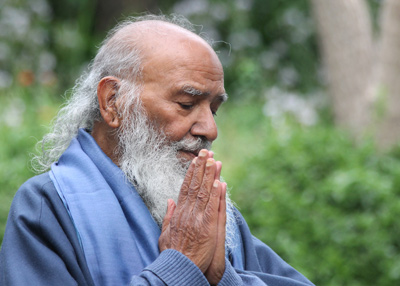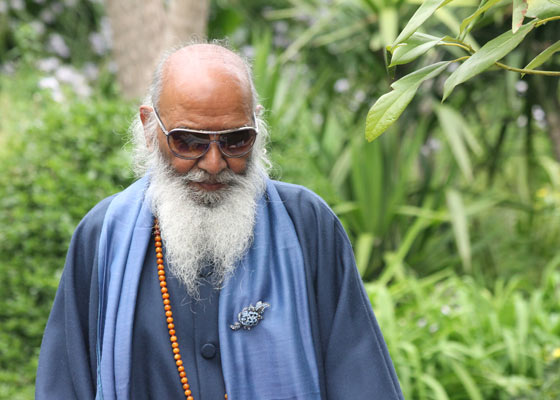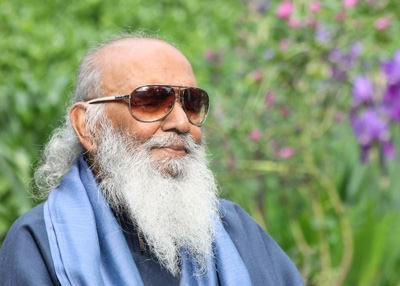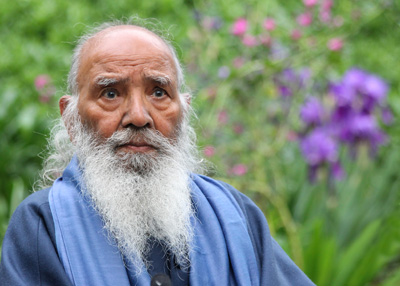You Can Never Be Free Without Me

You have spoken about the concept of incarnation. I’ll talk about incarnation later on, but you have to know what “concept” is. Concept exists in this lifetime, and your shirt did not make it—although a tailor can make your shirt, and a tailor can have a concept of a shirt. Your body does not make you. So the body is a shirt, but you, the tailor, can make a concept. The tailor can also make a concept of a coat, pants and undershirt. But who is that who has made a bird with his concept? Who has made the lion with his concept? Who has made the human being with his concept? Who has made the concept of a human male and a human female, and their meeting together, and who was made the concept of a child? The concept-maker never incarnates as a form.
So this concept is a mental concept, that you exist as Stevie Ray and Stevie Ray will die and will again take birth. This is all mental concept. It is called the imaginative sense, which makes many bodies on the canvas, which is the Space. If the conceptual statues, forms, drawings or photographs are made out of Space, then what are they? They are not incarnations of Space, but Space itself. And who is that, out of Space, who is making the photographs on Space? The same Space. So Space is the subject, Space is the object, and the space in-between is the same Space. When you come to know Space-Space-Space—that Space is birth, so Space is living, and Space is death—then where are incarnations? It is Space forever.
So there is no question of the memory of this body in the next incarnation. Space has nothing to do with this, because Space never dies and Space never takes birth. Yet you see that people are born, they are made-figures, which they themselves think. When they dream, they make figures. And after death, the Space also makes figures. This continuous working of the Space goes on. Space alone is.Satyendra: One thing I wonder about is if this type of wondering is fruitful at all?
Swamiji: No, it’s not fruitful. Because wondering is for wonderful people. [Laughter]
Satyendra: So I’m not allowed to? I’m not wonderful enough to wonder?
Swamiji: You’re allowed to wonder, but being a wonderful person.
Satyendra: How do I become wonderful?
Swamiji: Space. You cannot make sense of it, whether it is short or long, left or right. Space-Space. It is wonder. Anything that can be described is not wonder. That which cannot be described, that is wonderful.
Satyendra: Swamiji, when you use words like “Pure Free Forever”—and sometimes you even say that is not the truth, because they are words—it is my current understanding that these are words which you use to describe the state that you are experiencing and words that you use to bring us there.
Swamiji: I am aware that you think you exist. But you do not know whether I know the same thing. [Laughter]
Satyendra: I do not know that.
Swamiji: If you ask me, and I’m sincere in telling you, then I will tell you that you have never existed. It’s always Me.
Satyendra: Swamiji, when you use the word “forever”…
 Swamiji: I have to use it for you, because you think that you are in time and space, in past, present and future. But for me, past, present and future is not there—it’s Forever. So Forever cannot be understood by a human being who thinks himself to be a person in time and space. He thinks he is causation. For him, time and space has made his mother, father and he himself. But Forever never makes. So it is the mental process that the world exists. Then you come to know that the mind is not there and Pure Space exists. As Leslie Sarah said, “Swamiji somehow came to know Me, that I’m always there.” Always. Not in the past, not in the present, not in the future. Always means all three times are not. You can check a human being. The statement of a human, the description of a human, is dependent on that Life, that Knowingness, which says that when there is past, present and future, then man is. If time is gone, man is not. If man is gone, time is not.
Swamiji: I have to use it for you, because you think that you are in time and space, in past, present and future. But for me, past, present and future is not there—it’s Forever. So Forever cannot be understood by a human being who thinks himself to be a person in time and space. He thinks he is causation. For him, time and space has made his mother, father and he himself. But Forever never makes. So it is the mental process that the world exists. Then you come to know that the mind is not there and Pure Space exists. As Leslie Sarah said, “Swamiji somehow came to know Me, that I’m always there.” Always. Not in the past, not in the present, not in the future. Always means all three times are not. You can check a human being. The statement of a human, the description of a human, is dependent on that Life, that Knowingness, which says that when there is past, present and future, then man is. If time is gone, man is not. If man is gone, time is not.
I say these words because you know them, they have some meaning. For a dead man, there is no meaning. For Space, which is never dead, there is no meaning. So Space and death is the same. Why is it that death is something and Space is something else? Then we say that this is beyond your mind’s understanding, with which you think, “I exist as Stevie Ray.” So we create a situation for you to hear and then to examine.…
. . . . . . .
Gangesh: … There are two kinds of experiences that really shaped my understanding, or the way I listen to you, the way I interpret what’s happening. One of them is that I experience the order of manifestation. There is the Absolute, and then out of the Absolute…
Swamiji: You never experience the Absolute. Because experience can be if any object is there or any subject is there. When, suppose, subject and object are not there, why would Experience have to work to get to know the subject or to get to know the object? Experience is Absolute. When I say Absolute, I have deleted your idea of subject and idea of object. Whatever remains is Pure Awareness. I said “Pure Awareness” because you can never see it. I give you the chance that, “You try,” but I already know that Pure Awareness, as Absolute, cannot be seen.
Gangesh: Swamiji, I don’t know what words to use…
Swamiji: You do not have to use them. If you don’t know what else you have to use, then give up.
Gangesh: Wrong way of expression. In meditation…
Swamiji: In meditation, right? But whose meditation? You remain just the same: as the waking state belongs to you, deep sleep belongs to you, and the dream state belongs to you, so now meditation belongs to you.
Gangesh: Yeah, so in meditation, which belongs to me, at one point there is no me there anymore, no me as a subject to have a relationship with some object. So when the subject and object is not there anymore, it’s not nothing, so now I will call it the Absolute.
Swamiji: Yes, it’s correct.
Gangesh: Ok. So the experience starts…
Swamiji:—when some kind of subject-object starts.
Gangesh: Yes, exactly. And the first object is consciousness. That is already in the field of experience—consciousness is experienced.
Swamiji: Consciousness is the wave of Experience. The Experiencer alone is. But when consciousness arises, only in the waking state, then man knows, “I am conscious.” Otherwise, in deep sleep, he is Param [Supreme]—Param Aatma, Param Self, or Param Bliss, Param Aanand. But the moment the waking state arises, it is human, mental, subjective, objective and in-between—drishta, drishti, drishya [seer, seeing, seen].The trio is made. So the trio is made in the waking state. In the dream state, the trio remains. But in deep sleep, there is no trio. You have found the human body to have a trio. Your eyes see some object, so they are the seer; and the object is to be seen; and in-between there is seeing. The eyes do not see the seeing. That is what I am saying, so that you can know, “Seeing must be there.” If the eyes see, and seeing is and the seen is, then all three must be one. But in between the parasite comes and says, “No, the object is different, the object is a form.”
 This you have somehow to understand. As long as you don’t understand, then you are expected to understand that form does not exist; it’s only the seeing part that exists. The visionary says Vision exists. The seer says the Drishta exists. The gyani [the knowledgeable one] says the Aatma exists. The Buddhist says Zero exists. But a human being thinks that zero means nothing, and one exists. How can one exist without zero? And how can zero exist without the Being, who is neither one, nor two, nor zero? That is the Absolute. In this way, we describe. If you get it, very good. If you don’t get it, then you will get it tomorrow.
This you have somehow to understand. As long as you don’t understand, then you are expected to understand that form does not exist; it’s only the seeing part that exists. The visionary says Vision exists. The seer says the Drishta exists. The gyani [the knowledgeable one] says the Aatma exists. The Buddhist says Zero exists. But a human being thinks that zero means nothing, and one exists. How can one exist without zero? And how can zero exist without the Being, who is neither one, nor two, nor zero? That is the Absolute. In this way, we describe. If you get it, very good. If you don’t get it, then you will get it tomorrow.
Gangesh: So consciousness is the wave of the Absolute. Then it becomes the object, and the subject-object relationship, and then the Absolute is said to be lost, because it is duality. In that duality, everything manifests out of it—like out of Mahat [universal intellect], the ahankaar [ego], intellect, world, senses and all those things manifest. [He speaks for a few minutes] … When you told me that my saadhana [practice for Realization] is the saadhana of Oneness, what I understood is…
Swamiji: Your saadhana is complete. You do not need saadhana after this. You need to eat, drink, help, do your engineering and everything. Your saadhana is complete. If your saadhana is not complete, then saadhana is necessary.
Gangesh: So I feel, Swamiji, that saadhana is not complete, because I have an experience of duality.
Swamiji: Then you are aware that it has not yet become known to you. It is mental, and the mind has this much capacity that whenever it is dissolved, it will never function. When it wakes up, in the waking state, then it starts functioning for duality. This is where a human being appears to have been made like that. But now you came to know that a human being dies. You may say or not say this, but this is your observation, this is your waking state—in relation to some being who is present and then dies. As long as he doesn’t die, you think he is present. This means, in your head he is. And the same head then knows that he is not. So why do you worry about a person who is alive or who has died? You should worry about your head. [Laughter] And that is not happening.The mind says, “No, no. I’ll analyse that. I’ll experiment on that. But not on me.” That is where a human being is. The moment the human mind arises, the human mind is true; and the individual is true, with name and form; and all the sanskaars are true—past, present and future. We discuss this, we talk, thinking that one day we’ll have talked enough. So sometimes, in order to allow you to speedily reach that Awareness, we say, “It is your sixty-fifth birthday, Manohar. So you know that sixty-five years ago, you were not born.” It’s not that I put a puzzle before you. It’s the truth. It’s the truth that sixty-nine years before, Dikpal, you were not. Ninety years before, Lorna [Dikpal’s mother] was not. And when Lorna was not, then you were not, Margie [his sister] was not, and her relations, her dogs, cats, horses, house and Edmonton were not. This is one example. But it’s the same with everyone.… Now you have reached. You have reached, and you have no problem of thought. So you are quiet.
Gangesh: Swamiji, it’s like you said before that the predicament of a human being is that when the mind is not, it’s not…
Swamiji: Predicament is not. You think that a human being is a predicament. There is no predicament. Rather, you predicate. [Laughter] You predicate that a human being exists. And he does not die. [Silence] You’re caught.
Gangesh: I’m trying to figure out what you said.
Swamiji: Figure it out! That’s wrong. Figure it out. You think that you will figure it out, and then Swamiji will say that what you have figured out is right. Continue figuring out.
Gangesh: Swamiji, I want freedom from the sense that the Absolute has changed into anything…
Swamiji: You can never be free without Me. [Applause]
Gangesh: That’s why I’m asking, I would say begging you. [Laughter]
 Swamiji: That’s why it is not you speaking, it is Me speaking. We like to speak, and to question, and answer, and speak, and listen, and speak. That’s my movie. Me. That is the Self. That Me is everyone—not in me, in my heart or in my tummy. Every appearance is Me. That is Paramaatma. But we don’t use that word. We say, “Me.” And you think that Me means that “He is saying that his hands and feet should be me.” Shaarda will say that she should be like me. It’s not that. Self! This is the work, as you said, the saadhana: know where the Self is in you. It is not word and meaning. It is Param. It is hidden to the mind. To the mind, it is not published—the mind only knows when a book is published, the mind does not know what the scientist says unless he writes a book and it is published. Then the mind knows, “Oh, it is Glen Kezwer.” He does not know otherwise.
Swamiji: That’s why it is not you speaking, it is Me speaking. We like to speak, and to question, and answer, and speak, and listen, and speak. That’s my movie. Me. That is the Self. That Me is everyone—not in me, in my heart or in my tummy. Every appearance is Me. That is Paramaatma. But we don’t use that word. We say, “Me.” And you think that Me means that “He is saying that his hands and feet should be me.” Shaarda will say that she should be like me. It’s not that. Self! This is the work, as you said, the saadhana: know where the Self is in you. It is not word and meaning. It is Param. It is hidden to the mind. To the mind, it is not published—the mind only knows when a book is published, the mind does not know what the scientist says unless he writes a book and it is published. Then the mind knows, “Oh, it is Glen Kezwer.” He does not know otherwise.
This is the situation of a human being. Then I should accept that this is the predicament of a human being. What do you have to do? Leave the predicament. The one who leaves the predicament is still there after leaving. That is what you are. Thank you. God bless you.
Copyright © 1999-2013 International
Meditation Institute. All Rights Reserved